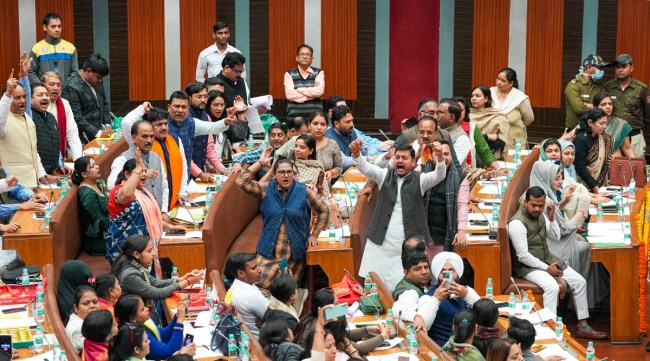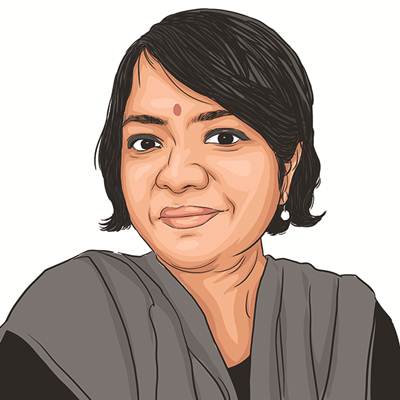Opinion AAP’s Reena Gupta writes: Impasse over Delhi mayor election is a symptom of Centre’s high-handedness
Centralisation of administration under bureaucrats has led to dysfunctional city governance
 Elections were finally held in December 2022. However, the process of electing the mayor has been disrupted maliciously in the interest of continuing administration through the central government-appointed bureaucracy. (PTI)
Elections were finally held in December 2022. However, the process of electing the mayor has been disrupted maliciously in the interest of continuing administration through the central government-appointed bureaucracy. (PTI) For almost a year now, Delhi, the capital of the world’s largest democracy, has been running without an elected mayor. The Supreme Court postponed the election of a mayor and deputy mayor again earlier this week – the election has already been delayed three times. This ongoing situation with no end in sight highlights the pressing need for democratically-elected and accountable local city administrations.
India is one of the fastest growing economies in the world: We are aspiring to be a 40 trillion economy by 2047. Sixty per cent of our GDP is generated in urban centres. Our cities are engines of economic growth and innovation, where productive firms, better-paying jobs and key institutions are located. Every second Indian now lives in an urban centre with the number of people living in urban areas expected to double by 2050. Rapid urbanisation has led to increased job opportunities, increased wages, and a higher quality of life for many people. Additionally, the increased density and connectivity of cities have made it easier for people to access essential services, such as healthcare and education.
However, fast urbanisation has also come with its challenges. For example, cities are now home to a range of social and economic problems, such as poverty, overcrowding, and air pollution. Additionally, the influx of people into cities has led to a shortage of housing, and many people have been forced to live in substandard conditions.
To address the challenges posed by rapid urbanisation in India, the governance of our cities must improve to match global standards. The 74th constitutional amendment, introduced in 1992, mandated the empowering of urban local bodies towards better functioning. However, in the last three decades, not much has improved in Indian cities. While lack of untied funding is a major challenge for city administrations, a bigger challenge for our cities under the current regime is the centralisation of administration at the hands of a select few bureaucrats appointed by the Union or state government. This tendency towards increasing bureaucratic control and centralisation goes against the principles laid down in the 74th amendment and is proving to be detrimental to the interest of millions of Indians who live and earn their livelihood in our cities.
Several municipalities, small and big, are being run in the country by Central or state government-appointed bureaucrats, and elections are either being delayed or scrapped without any accountability to the citizens. For close to a year, the Brihanmumbai Municipal Corporation (BMC) – the country’s richest civic body – has been managed by an administrator after its term expired and polls were delayed. Further, an astonishing 22 of 28 municipal corporations in Maharashtra have seen their terms expire with fresh polls nowhere in sight. In Uttar Pradesh and Karnataka, state governments have been delaying the local body elections under some pretext or the other. This high-handed manner of dealing with urban local bodies in BJP-ruled states leads to dysfunctional and unaccountable city governance. It also breaks citizens’ trust in the system as they lose hope without having democratically elected councillors to represent their interests and address grievances.
In Delhi, after completing a 15-year tenure in the Municipal Corporation of Delhi (MCD) in March 2022, the BJP, through the Centre, delayed the MCD election by eight months on the pretext of merging the three corporations and an unscheduled delimitation exercise. Elections were finally held in December 2022. However, the process of electing the mayor has been disrupted maliciously in the interest of continuing administration through the central government-appointed bureaucracy. This is happening at a time, when Delhi, the national capital will be hosting the G20 summit. Major global cities like New York, Tokyo and London have strong local governments, where elected mayors are designated as executive heads. Both Mumbai and Delhi, at the moment, are administered by unelected bureaucrats. The Expert Committee on Urban Infrastructure (2011) recommended that the ‘Commissioner’ should act as a city manager and should be recruited through a transparent search-cum-selection process led by the mayor. But in India, political interference from the central government, either through the governor or Lt Governor’s Office, gives a backdoor entry to party workers of the ruling party to the corporation — in the long run, the country suffers.
The Prime Minister often speaks about “Amrit Kaal” and the “Azadi ka Amrit Mahotsav”, and this decade belonging to India. But the actions of his government seem to derail what is required to build a strong democratic structure in the country. Notable Indian freedom fighters campaigned hard for better civic governance in cities. Aruna Asaf Ali and Subhash Chandra Bose were elected mayor.
Indian urban local bodies are amongst the weakest in the world in terms of fiscal autonomy and have limited effective devolution of revenue. They also have limited capacity to raise resources through their own sources of revenue such as property tax. Municipal revenue in India accounts for only one per cent of the GDP (2017-18). This leads to a dependence on transfers by the state and central government. For the nation to grow, it is important that our growth engines, the cities, remain a space for vibrant democracy and accountable civic governance. It is now time to restore cities of the people, by the people, for the people.
The writer is an Advocate & National Spokesperson of the Aam Aadmi Party






